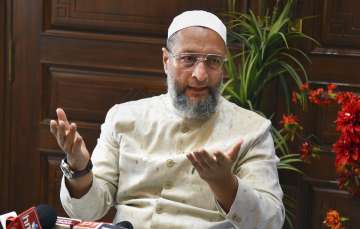All India Majlis-E-Ittehadul Muslimeen (AIMIM) chief Asaduddin Owaisi on Saturday sharply criticised the Centre for abstaining from a UN General Assembly resolution calling for a 'humanitarian truce' in the ongoing conflict between Israel and Hamas.
The resolution titled "Protection of civilians and upholding legal and humanitarian obligations" was overwhelmingly adopted with 120 nations voting in its favour, 14 against it and 45 abstaining, including India.
"India has always supported a negotiated two-state solution to the Israel-Palestine issue leading to the establishment of a sovereign, independent and viable State of Palestine living within secure and recognised borders, side-by-side in peace with Israel. For this, we urge the parties to de-escalate, eschew violence and work towards creating conditions for an early resumption of direct peace negotiations," sources said.
Taking to social media platform X, Owaisi said, "It is SHOCKING that @narendramodi govt abstained on the @UN resolution for a humanitarian truce & protection of civilian lives. 7028 people have been killed by Israel in Gaza. Over 3000 of them are children & 1700 women. At least 45% of housing in Gaza has been destroyed."
He further remarked that Gazans faced a complete blockade and had to depend on humanitarian aid, further adding that things have only worsened since the war began.
"This is a HUMANITARIAN issue, not a political one. In abstaining on the resolution, India stands alone in the Global South, in South Asia & in BRICS. Why did India abstain on an issue concerning civilian life? After sending aid to Gaza, why abstain? What happened to “one world one family”? & “vishwaguru”?" he further added.
The AIMIM chief also said that India's foreign policy was inconsistent, as Prime Minister Narendra Modi had abstained from the resolution despite condemning the Hamas attack and speaking to the Jordanian leadership, who introduced the resolution.
What was India's stand?
Besides India, countries that abstained included Australia, Canada, Germany, Japan, Ukraine and the UK. Sources familiar with the matter said that the UNGA resolution did not include any explicit condemnation of the Hamas attacks of October 7.
"An amendment was moved to include this aspect, prior to the vote on the main Resolution. We voted in favour of the amendment and it obtained 88 votes in favour (but not the requisite two-thirds majority). In the absence of all elements of our approach not being covered in the final text of the Resolution, we abstained in the vote on its adoption," said sources.
"India has always supported a negotiated two-state solution to the Israel-Palestine issue leading to the establishment of a sovereign, independent and viable State of Palestine living within secure and recognized borders, side-by-side in peace with Israel. For this, we urge the parties to de-escalate, eschew violence and work towards creating conditions for an early resumption of direct peace negotiations," said India's Deputy Permanent Representative to the United Nations Yojna Patel
The adoption of the Jordanian resolution is the first formal response of the United Nations to the escalation of violence in Israel and Palestine since the Hamas terror attacks of 7 October.
The Palestinian death toll in Gaza has soared past 7,300, more than 60% of them minors and women, according to the territory's Health Ministry. The overall number of deaths far exceeds the combined toll of all four previous Israel-Hamas wars, estimated at around 4,000.
The Israeli military said that it was “expanding” ground operations in the territory and was moving closer to an all-out invasion of Gaza in its objectives to "crush" the Hamas militant group responsible for an unprecedented attack on October 7 that killed more than 1,400 people in Israel.
ALSO READ | Uddhav Thackeray can form alliance with Owaisi to come back into power, may hug Hamas one day: Eknath Shinde
Latest India News
